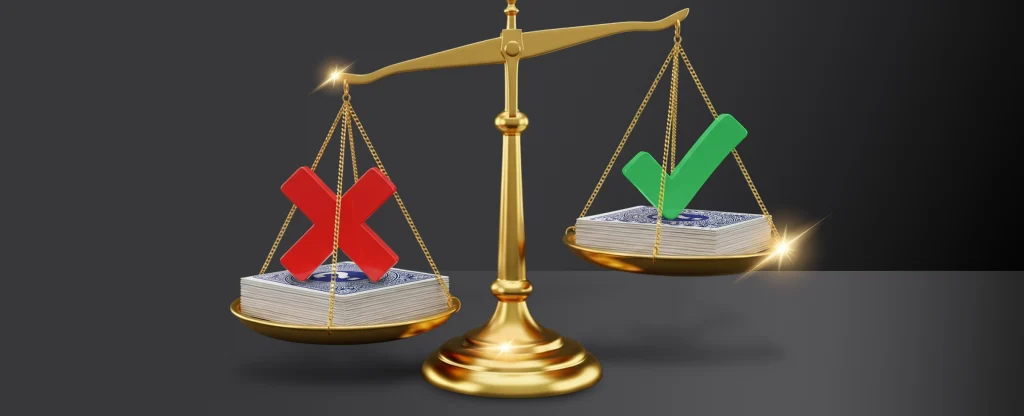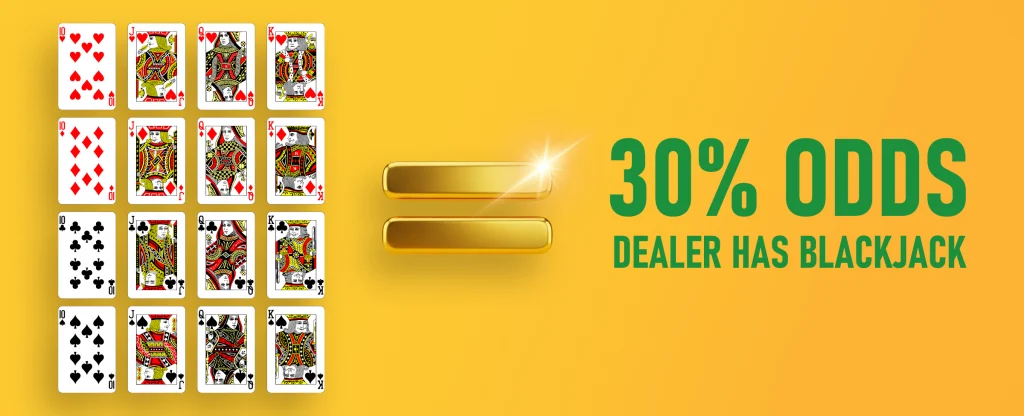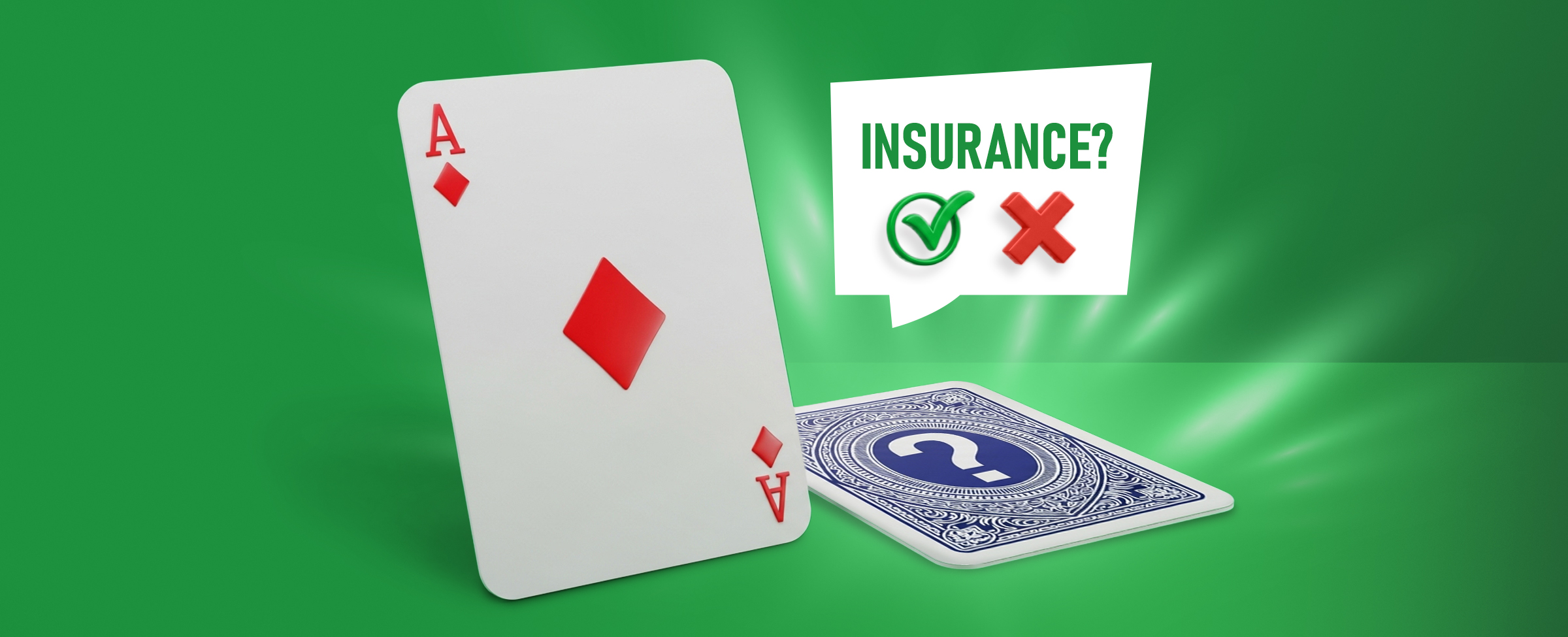While the basics of blackjack is trying to beat the dealer without going over 21, there are a few versions of the classic form as well as optional side bets that pop up during the game. Insurance is one of the most common ones. Here at Joe Fortune, we decided it would be a good idea to explain what insurance is in blackjack and provide an easy overview to help you decide whether it fits in with your gameplay.
In summary, it is a side bet that gives you a chance to protect your hand if it looks like the dealer might have a natural blackjack (21). It’s often offered when the dealer’s upcard is an Ace, making it a potentially very strong position for the house to be in. On the surface, insurance might seem like a sensible move, after all who wouldn’t want to cover themselves when the dealer’s looking dangerous? But dig a little deeper, and things get a bit more complicated.
What Does Insurance Mean in Blackjack?
Insurance in blackjack is a separate bet which is offered to players when the dealer’s face-up card is an Ace. The idea is that you’re betting on whether the dealer’s hidden card is a ten-pointer i.e. 10, Jack, Queen, or King. If it is, the dealer has blackjack and that’s not what players want to see unless of course you buy insurance.
The insurance bet pays out 2 to 1 if the dealer hits a blackjack. If not, you lose the insurance bet and continue playing your hand as normal. Let’s say you’ve bet $40 on your hand, and the dealer shows an Ace. You’re offered insurance. You decide to place an insurance bet of $20, half your original bet. If the dealer reveals a 10-value card, they’ve got blackjack and you lose your main bet, but return $60 from insurance, which pretty much should even things out.
If the dealer doesn’t have blackjack, you lose the $20 insurance bet and continue playing the rest of the hand. It’s worth noting insurance doesn’t protect your hand from losing in general as it only pays out if the dealer has a natural blackjack.

When to Take Insurance
Now… this is the big question, should you take insurance? We reckon that the short answer for most players is no, not usually. Insurance is tempting because it feels like a safety net. But in reality, it’s a bet on whether the dealer’s face-down card is a ten-value card. Since there are 16 ten-point cards in a standard 52-card deck, the chance of this happening is about 30% which doesn’t quite make up for the 2 to 1 payout on offer. However, there are some situations when getting insurance might make sense which are as follows:
- In specific single-deck games: With only one deck in play, it’s slightly easier to work out the card distribution. Still, unless you’ve been closely tracking cards, it’s not usually recommended.
- If you’re counting cards: Advanced and experienced players using card counting techniques can sometimes tell when there’s a high chance of ten-point cards left in the deck. In these cases, insurance can become a profitable play. But for novices or casual players, insurance is best left alone but let’s get into the pros and cons.
Pros and Cons
Like most side bets, insurance has its upsides and downsides. Here’s something of a balanced look to offer you both sides:
Pros.
- Potentially useful for card counters who have a pretty good read on the remaining cards in the shoe.
- Limits losses on a dealer blackjack. If the dealer hits a natural, insurance does help you avoid losing your full stake.
- Gives you the chance to break even on a hand if you’ve bet insurance and the dealer does get blackjack.
Cons.
- Eats into your winnings: Over time, taking insurance regularly will drain more money than it saves, unless you’re playing with an edge.
- Encourages poor habits: It can tempt new players into making emotional, rather than mathematical, decisions.
- High house edge: For most players, insurance increases the house’s advantage, not yours.
- Not actually protective: Despite the name, insurance doesn’t protect your hand unless the dealer has blackjack.

Odds and Payouts
Understanding the maths behind the insurance bet is vital to deciding whether to take it or not.
When you take insurance, you’re betting that the dealer’s hole card is worth 10 points. In a standard deck there are 4 Tens, 4 Jacks, 4 Queens and 4 Kings. That’s 16 ten-point cards out of 52 total cards, assuming no cards have been dealt yet. That gives you odds of about 30% that the dealer has blackjack.
However, the insurance bet only pays 2 to 1. For a 30% chance of winning, the payout would need to be closer to 3.25 to 1 for it to be mathematically fair. This mismatch is why insurance is generally considered a poor-value bet. Even in games with multiple decks, the percentages don’t change drastically enough to shift the advantage into your favour. That is, of course, unless you’re counting cards.
How Much is Wagered on the Insurance Bet?
The size of an insurance bet is always half of your original wager, here’s an easy-to-follow example:
- If you bet $10 on your blackjack hand, the insurance bet is $5.
- If your bet is $100, you can place up to $50 on insurance.
- If you’re playing multiple hands, you can place an insurance bet on certain hands and are not obliged to do so on each of them.
This fixed ratio makes it simple to understand and manage. However, it also means that if you’re betting big on the hand, you’ll be tempted to place larger insurance bets, increasing your risk. It’s worth remembering that the insurance doesn’t affect the outcome of your main hand, they’re entirely separate bets.
Is Insurance Worth It?
So, is it ever worth taking insurance in blackjack? For most players, the answer is a clear no and here’s why:
- It adds volatility to your bankroll: If you have a specific amount to play this adds more to what you might have decided to spend. Regularly taking insurance increases the variance of your wins and losses, often leading to quicker downswings.
- The odds aren’t in your favour: You’re betting on something with around a 30% chance of success, but you’re only getting paid 2 to 1.
- It’s a distraction from your gameplay and basic strategy: Players focusing too much on side bets such as insurance can drift away from optimal decision making on their main hand or hands.
Final Thoughts
Insurance in blackjack is one of those things that sounds like a good idea, but rarely is for everyday players. While the name gives the impression of safety, it’s a risky side bet that mostly benefits the house. It is also worth being aware that not every version of blackjack offers you the chance to place an insurance bet, if it is something that you want to bet on, be sure to check the rules before you put your chips down.
Unless you’re an experienced player with a deep understanding of deck composition and card counting, it’s best to skip insurance entirely. The best thing to do is focus on mastering and improving your basic blackjack strategy, managing your bankroll, and making the smartest decisions with each hand as that’s how you get the most value and fun from your time at the table. At the end of the day, blackjack is social and engaging. So, enjoy the game, play smart, and don’t let the distractions of side bets throw you off your game. Keep your head clear, your bets consistent, and you’ll stand a much better chance at walking away a winner.
